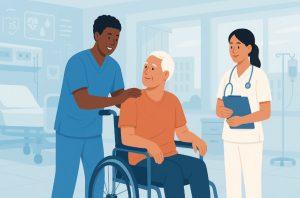Health Care Assistants (HCAs) play an indispensable role in the UK’s healthcare system. Often operating on the frontline of patient care, they offer both clinical and emotional support in hospitals, care homes, and community settings. Although the role may be entry-level, its significance is far from basic.
HCAs are trusted to care for vulnerable individuals, carry out essential duties, and contribute directly to a patient’s recovery and comfort. This blog explores the roles of a health care assistant, focusing on their responsibilities, necessary skills, and opportunities for growth particularly in London and across the UK.
What Are the Primary Roles and Responsibilities of a Health Care Assistant?

The role of a Health Care Assistant revolves around direct patient care and support. These responsibilities are fundamental to maintaining the health and dignity of patients, many of whom are elderly, disabled, or in need of ongoing medical supervision.
Understanding the Core Responsibilities
Health Care Assistants are responsible for assisting patients with basic daily tasks such as washing, dressing, and eating. These may appear simple but are vital for patients who cannot care for themselves. The HCA ensures their dignity, hygiene, and comfort are always preserved.
Beyond basic care, HCAs are often tasked with monitoring vital signs, observing patient behaviour, and reporting concerns to nursing staff. These responsibilities are crucial in identifying potential health issues before they escalate.
Supporting a Safe and Clean Environment
Another critical role of HCAs is maintaining a clean, safe, and hygienic environment. In hospitals and care homes, this includes disinfecting equipment, changing bedding, and ensuring patient rooms are free from hazards. Infection control is a constant priority.
How Do Health Care Assistants Support Nurses and Medical Teams?
Health Care Assistants are integral to the medical team, acting as a bridge between patients and clinical professionals. Their collaboration with nurses, doctors, and allied health staff enables smoother, more efficient care delivery.
Collaborating with Nurses
One of the most common interactions HCAs have is with registered nurses. They help prepare patients for examinations, assist with mobility during rounds, and support wound care or catheter maintenance under supervision. Their ability to carry out delegated clinical tasks allows nurses to focus on more complex care duties.
Assisting During Clinical Procedures
In busy healthcare environments, HCAs may also be asked to prepare treatment areas, support infection control measures, and monitor patient responses during procedures. Though they are not licensed to administer certain treatments, their presence during procedures provides reassurance to patients and helps ensure smooth coordination.
What Daily Duties Does a Health Care Assistant Perform?
A typical day in the life of a Health Care Assistant is dynamic and varies depending on the workplace. However, the consistent element is patient-centred care.
Morning and Evening Routines
HCAs begin their shifts by helping patients with morning routines. This may involve helping them out of bed, washing, dressing, and getting settled for breakfast. These routines not only promote hygiene but also offer moments of connection and reassurance for patients.
During the day, HCAs continue supporting patients with mobility, whether walking to appointments, using a wheelchair, or preventing falls. In care homes, they often lead recreational activities or engage in conversations to combat loneliness.
Evening routines include assisting patients into bed, monitoring night-time needs, and ensuring they are comfortable before resting.
Maintaining Patient Records and Observations
Though not licensed to diagnose, HCAs are responsible for observing patient behaviour and changes in condition. Recording this information such as appetite, sleep patterns, or unusual symptoms is a vital component of coordinated care. These records allow nurses and doctors to track progress or spot early signs of concern.
What Skills Are Essential for a Successful Health Care Assistant?

Being a Health Care Assistant requires a specific set of interpersonal and practical skills that go far beyond clinical ability. It’s about having the right mindset to care for individuals with compassion, patience, and professionalism.
Emotional Intelligence and Empathy
Perhaps the most essential skill is empathy. HCAs must understand the emotional needs of patients, especially when they are anxious, in pain, or confused. Treating every patient with kindness, regardless of mood or condition, is a non-negotiable part of the role.
Strong Communication and Listening Skills
Effective communication allows HCAs to interact respectfully with patients and work cohesively with colleagues. Listening to patients’ concerns, explaining procedures in a calm voice, and updating clinical staff accurately all require clarity and attentiveness.
Physical Stamina and Adaptability
Working on your feet for long hours, moving patients safely, and handling emotionally charged situations can be physically and mentally demanding. The best HCAs are adaptable, able to shift gears quickly depending on emergencies, patient needs, or changes in routine.
What Qualifications and Training Are Required to Become a Health Care Assistant in the UK?
Becoming a Health Care Assistant in the UK is relatively accessible, making it an attractive career for those interested in healthcare without years of formal education.
Entry Requirements and Personal Qualities
Most employers do not require formal qualifications beyond basic literacy and numeracy. However, a caring personality, willingness to learn, and reliability are essential traits. Having prior experience in a care setting, even on a voluntary basis, is advantageous.
On-the-Job Training and Professional Development
Once hired, new HCAs often complete the Care Certificate, which covers 15 key standards such as safeguarding, infection control, and basic first aid. Many also pursue further qualifications like the Level 2 or Level 3 Diploma in Health and Social Care, which can lead to more advanced roles.
Apprenticeships and NHS training programmes are also popular routes. These allow individuals to earn while they learn and build up a robust set of skills without incurring university debt.
How Does a Health Care Assistant’s Role Differ from a Support Worker?
While both roles involve caring for others, there are distinct differences in responsibilities, settings, and required training.
Key Differences in Focus and Scope
Health Care Assistants often work in clinical environments like hospitals and GP surgeries. Their duties are more medically focused helping with personal hygiene, observing health conditions, and supporting the nursing team.
Support Workers, on the other hand, usually operate in community settings, helping clients live independently. This may include supporting people with learning disabilities, mental health conditions, or substance abuse issues.
Career Path and Training Variations
HCAs are often more closely aligned with the NHS career pathway, making it easier to transition into nursing roles. Support Workers may move into social work, rehabilitation, or specialised care sectors based on experience.
In What Ways Do Health Care Assistants Impact Patient Experience and Recovery?

The human connection that HCAs provide is just as vital as their clinical tasks. Their role has a measurable impact on a patient’s emotional wellbeing and overall recovery.
Building Trust and Emotional Security
Many patients, especially those in long-term care, interact more frequently with HCAs than with nurses or doctors. This consistent presence builds trust and can help reduce feelings of loneliness or anxiety. A smile, gentle tone, or kind word can significantly uplift a patient’s mood.
Encouraging Participation in Recovery
HCAs often play an informal motivational role, encouraging patients to eat properly, move around, or follow treatment plans. This kind of personalised attention helps patients stay engaged in their recovery process.
What Are the Career Progression Opportunities for Health Care Assistants in London?
For those who are committed and passionate, the HCA role can open the door to numerous advancement opportunities, especially in London where healthcare facilities are abundant and diverse.
Advancing into Clinical Roles
With additional qualifications and experience, many HCAs move on to become Nursing Associates or even Registered Nurses. Programmes like the NHS Nursing Degree Apprenticeship allow HCAs to study while continuing to work.
Exploring Specialised Pathways
There are also opportunities to specialise in areas such as maternity care, mental health, palliative care, and theatres. These roles require more in-depth training but offer higher pay and deeper expertise.
Non-Clinical Career Options
Some HCAs go on to become team leaders, care coordinators, or even healthcare trainers. These roles combine experience with organisational and teaching skills, making them ideal for HCAs who want to mentor others or step into administrative roles.
Why Are Health Care Assistants Vital to the UK Healthcare System?
Health Care Assistants are the unsung heroes of the NHS and care systems. Their dedication helps ensure the system continues to function efficiently, even during crises.
Filling Critical Workforce Gaps
The UK is facing a staffing shortage across all healthcare professions. HCAs help relieve the pressure on overburdened nurses and doctors by taking on tasks that would otherwise delay care delivery.
Providing Person-Centred, Holistic Care
Where medical professionals must often focus on diagnostics and treatment, HCAs provide the hands-on support that truly defines person-centred care. They ensure every patient is seen, heard, and treated with respect.
Conclusion
The roles of a health care assistant go far beyond assisting with daily tasks. They serve as a vital link between clinical teams and patients, offering both medical and emotional support. In hospitals, care homes, and community settings, HCAs carry out responsibilities that directly influence recovery, comfort, and overall patient experience.
With accessible entry routes and clear career progression opportunities, becoming a Health Care Assistant in the UK especially in a thriving hub like London is not only a meaningful job but a promising career path.
FAQs About Roles of a Health Care Assistant
What is the starting salary for Health Care Assistants in the UK?
Entry-level HCAs typically earn between £21,000 and £23,000, with higher salaries available in London due to the cost of living.
Can Health Care Assistants specialise in specific areas of care?
Yes, many HCAs go on to work in areas such as mental health, maternity, theatres, or palliative care with additional training.
Is prior experience required to become a Health Care Assistant?
Not necessarily. Many HCAs start with no experience and are trained on the job, especially within NHS programmes.
Do Health Care Assistants work full-time?
Most HCAs work full-time shifts, but part-time and flexible contracts are also available, particularly in NHS trusts.
Are there apprenticeships for becoming an HCA?
Yes, apprenticeships are a common route, especially for school leavers or career changers looking to enter the care sector.
What are the most rewarding aspects of being an HCA?
Many HCAs find great fulfilment in building relationships with patients, contributing to recovery, and making a tangible difference every day.
Can HCAs work in private healthcare or just the NHS?
HCAs can work in both sectors, including private hospitals, care homes, and community care settings.









Leave feedback about this